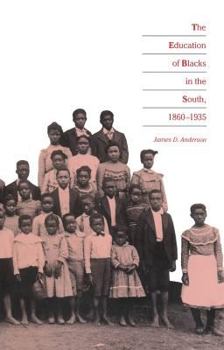The Education of Blacks in the South, 1860-1935
Select Format
Select Condition 
Book Overview
James Anderson critically reinterprets the history of southern black education from Reconstruction to the Great Depression. By placing black schooling within a political, cultural, and economic context, he offers fresh insights into black commitment to education, the peculiar significance of Tuskegee Institute, and the conflicting goals of various philanthropic groups, among other matters. Initially, ex-slaves attempted to create an educational system that would support and extend their emancipation, but their children were pushed into a system of industrial education that presupposed black political and economic subordination. This conception of education and social order--supported by northern industrial philanthropists, some black educators, and most southern school officials--conflicted with the aspirations of ex-slaves and their descendants, resulting at the turn of the century in a bitter national debate over the purposes of black education. Because blacks lacked economic and political power, white elites were able to control the structure and content of black elementary, secondary, normal, and college education during the first third of the twentieth century. Nonetheless, blacks persisted in their struggle to develop an educational system in accordance with their own needs and desires.
Format:Hardcover
Language:English
ISBN:0807817937
ISBN13:9780807817933
Release Date:September 1988
Publisher:University of North Carolina Press
Length:381 Pages
Weight:1.05 lbs.
Dimensions:5.9" x 9.0"
Customer Reviews
4 ratings
History of Postbellum education in US
Published by Thriftbooks.com User , 15 years ago
An interpenetration of the development of public education, propelled by African Americans emerging from slavery. Anderson lays a clear path in the history of education in the US. Rich data, well written, and descriptive! Good companion for Webber's book.
educatio 1860
Published by Thriftbooks.com User , 17 years ago
This is a magnificent book. Fantastic readings and pictures that hold you to the events and give you a deeper understanding of what is going on during this time. Charts and graphs keep your perspective grounded. I highly recommend this book to anyone who interested in African American studies or to hear the truth about history.
Booker T. Washington and Industrial Education
Published by Thriftbooks.com User , 22 years ago
This work does an excellent job of describing how Washington did not really want "vocational" education, but instead "industrial" education, to educate blacks for a "place" and stifle dissent. It also does a good job of describing the "softer" discrimination philosophy of the North, and contextualizing the Northern industrialists, who saw industrial education as a way to pit blacks and immigrants against each other. An excellent discussion of black education, the fights of teacher training, and uplift.
Everything We Were Not Told
Published by Thriftbooks.com User , 22 years ago
This book represents a well documented work. Using primary sources, Anderson describes the heroic African American efforts to gain, through education, the participatory citizenship status which they deserved. In the process, he exposes the Caucasian American (both northern and southern) efforts to blantantly repress these education efforts and to disenfranchise African Americans of their due. History lessons on this book may be applied to our contemporary educational setting.Anderson employs a large number of statistics and examples to support his case. The nature of the book's content requires such documentation to dispell historical myths which history textbooks commonly espouse however.This book is an excellent read for history and education enthusists, as well as anyone else interested in opening their minds.






